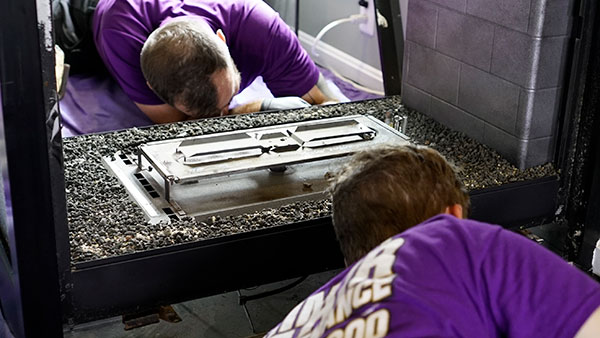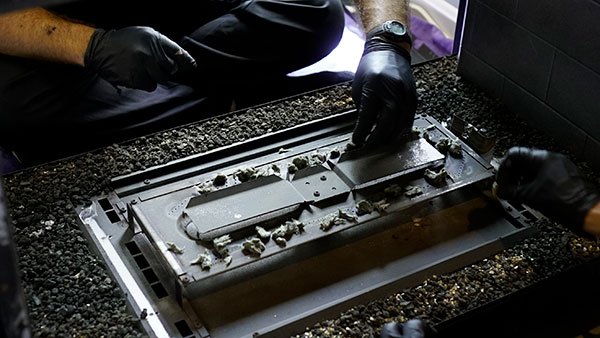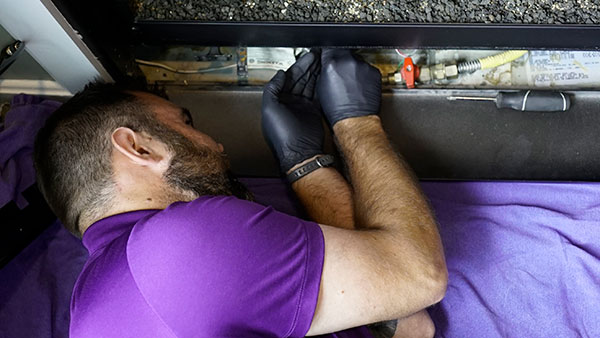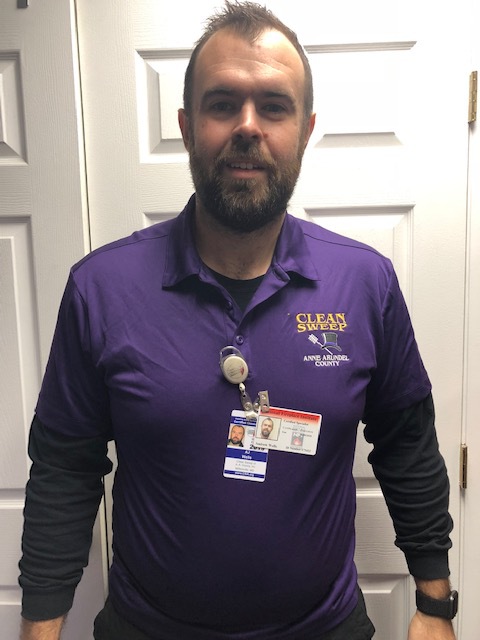We’re Anne Arundel County’s Gas Fireplace, Stove & Insert Specialists
Gas fireplaces, stoves, and inserts are valued by homeowners and incredibly popular because of their ease of use and convenience. They also require less maintenance than wood or pellet appliances, but that’s not to say they’re maintenance-free — they’re not. You’ll still need to keep up with yearly service and maintenance to ensure proper operation of the gas logs. For everything — from gas fireplace installation to ongoing maintenance and repair — you can count on Clean Sweep of Anne Arundel County. As CSIA- and NFI-certified Gas Specialists, we’re trained and qualified to sweep, inspect, and service gas appliances of all types. Not only does our team understand what it takes to keep your gas fireplace, stove, or insert clean, efficient, and working as safely as possible, but we also know just what to do when something isn’t working quite right.

Gas Technicians Working on Gas Fireplace

Gas Fireplace being Taken Apart

Gas Fireplace Technician
Some Common Problems and Services We Can Help With
- Your pilot light is on and your gas is on, but your fireplace won’t light.
- Your pilot light went out.
- You need to have the embers in your gas fireplace replaced.
- You’re ready to have a new gas fireplace, insert, or stove installed.
- You need yearly service for your gas appliance.
- You’re ready to upgrade to a new gas fireplace, insert, or stove.
No matter what you may need, having a CSIA- and NFI-trained and certified gas technician do the work will ensure that everything is done correctly for safe and efficient operation. Have some questions about gas fireplaces, stoves, and inserts? We’re here to help. Below, we’ve answered some of the most common questions regarding gas fireplaces. Keep reading, and if you still have questions, feel free to give us a call. We’ve also put together a checklist that covers a few issues you might be able to solve easily. Check out our gas fireplace troubleshooting checklist.

Meet NFI Certified Tech, AJ!
Commonly Asked Questions
How Often Should a Gas Fireplace Be Swept?
Any gas fireplace — whether it is a gas insert, a gas stove, or a fireplace with gas logs — requires annual service. While gas fireplaces certainly don’t produce the soot and creosote that wood-burning fireplaces do, they still require technical servicing and debris removal, which is taken care of during this annual service.
Do You Have to Service a Gas Fireplace?
Gas fireplaces are fueled by natural or propane (LP) gas. All gas fireplaces need annual service for correct, efficient, and safe operation. Annual service is important because it allows the unit to be properly cleaned, tested, and checked for anything that could reduce appliance safety or efficiency. Valves, connections, thermocouples, thermopiles, and the venting system need to be checked for wear and suitability for use.
What Are the Signs It’s Time to Have Your Gas Fireplace, Insert, Logs, or Stove Serviced?
- Soot buildup near the firebox (on furniture, pictures, etc.)
- Inability to view fire due to white, brown, or black coating on the glass
- The pilot light will not light
- The burner takes 5 or more seconds to light
- Large pops when lighting the burner
- Unusual odors coming from the appliance
What Can You Expect When You Have Your Gas Appliance System Inspected and Swept?
Our gas-certified technician conducts a complete thorough inspection /service of your system, which includes these tasks:
- Check combustible clearances
- Check for carbon monoxide
- Leak and pressure check
- Remote operation check and battery replacement (if applicable)
- Inspection and sweeping of the blower
- Brushing and vacuuming the firebox
- Inspect vent system/chimney inside and out
- Check termination vent cover and wall connection for clearance and weather tightness
- Removal, cleaning, and inspection of the burner, including the thermocouples, thermopiles, and standing pilot light or electronic ignition
- Removal and cleaning of gas logs
- Removal and replacement (if necessary) of embers
- Check pilot voltage and assembly
- Overall operation
- Glass cleaning and seal inspection
Once the appliance has been checked for correct and efficient operation, before leaving your home, our technician will complete a condition finding report. This report will be typed on an iPad and will include labeled colored photos of the interior and exterior of your system. Your report will be emailed to you after the service. This service takes approximately 1-1/2 hours.
Do Plumbers Install Gas Fireplaces?
Plumbers are licensed to install the gas lines and make the connection to the appliance. For gas appliance installation, you should call a CSIA- and NFI-certified gas professional.
Do Gas Fireplaces Need to Be Vented?
Some gas fireplaces do and some do not. There are actually three different types of gas appliances: vent-free or ventless, b-vent or natural vent, and direct vent. In a nutshell:
- Vent-free or ventless fireplaces do not need to be vented because of their high efficiency levels and their low emission rates. The cons: Some people can be sensitive to the combustion fumes that are produced by the appliance, and these appliances can also expel moisture into the home, which can cause condensation inside.
- B-vent or natural vent appliances must be vented through a pipe that terminates through the roof. These fireplaces use some of the home’s indoor air for combustion. The cons: You could experience downdrafts, lose heat from the appliance up through the vent, and installation can be costly or challenging because of how the B-vent fireplace must be vented.
- Direct vent fireplaces are vented through a wall in the home and have a two-part system: a vent that brings outside air in for combustion, and a vent that takes fumes out of the home. Because the system is completely sealed, you don’t lose any heat through the vent or experience cold air coming down through the vent. Another major perk is that these appliances are highly efficient. The cons: These fireplaces typically have lower flames than b-vent fireplaces and you can’t re-position the logs at all. They also have a sealed glass front, which for some people, may take away from the open hearth feel.
No matter which type of gas appliance you choose, your gas appliance should be installed as per the manufacturer’s specifications. When you trust your gas fireplace installation to the NFI- and CSIA-certified gas specialists at Clean Sweep of Anne Arundel County, you can rest assured everything will be installed and vented properly. We guarantee it!
From Yearly Service to Sweepings & Inspections, We Do It All
Whether you’re looking for help with gas appliance installation or you need to schedule yearly service, give Clean Sweep of Anne Arundel County a call at 410-590-4800. We’re always happy to help, and our technicians have the certification and experience needed to do the job right.
Clean Sweep of Anne Arundel County can provide you with several product catalogs to help you find the right wood stove or insert. Ask us today!
